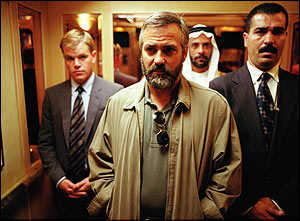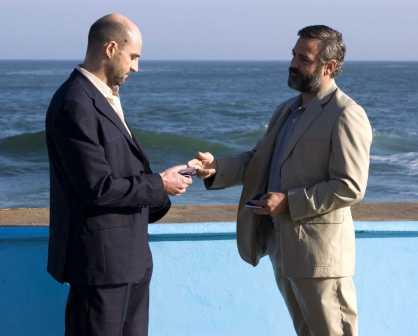A new report by Rep. Henry Waxman discloses some of Halliburton/KBR’s billing shadiness in Iraq. “In one case, the government’s contracting officials reported that KBR attempted to inflate its cost estimates by paying a supplier more than it was due. In another, KBR cut its cost estimates in half after it was pressed on its true expenses. In a third, KBR billed for work performed by the Iraqi oil ministry.“
Tag: Corporate Malfeasance
The Raptors Bite Back.
“‘We rely on those transactions,’ Mr. Lay said during the September meeting, according to Mr. Glisan. ‘They are imperative for us to hit our numbers and we will continue to do them.‘” Prosecutors begin to wrap up their case in the Enron trial with the testimony of former Enron treasurer Ben Glisan, Jr., who is currently serving a five-year prison term for his part in the fraud. (He created Enron’s “Raptors,” “four fragile financial structures…used to house assets and investments and to hide losses.”) According to the NYT, he “provided some of the strongest testimony against Mr. Lay heard by the jury so far.”
Get the Lead out.
A (belated) follow-up: Last year, I posted here about the efforts by major chemical companies to bury Deceit & Denial, the recent work by public health historians David Rosner and Gerald Markowitz, which found that said companies knowingly obfuscated, downplayed, and generally lied about the fact that some of their products caused cancer. A few weeks ago, the other shoe dropped, when — relying on the documents unearthed by Rosner & Markowitz — a Rhode Island jury found lead paint manufacturers guilty of “public nuisance.” “The verdict on the issue of liability paves the way for a potential damage award of millions of dollars in cleanup and mitigation costs.” And, since then, California has reinstated a class-action case against the lead paint industry, and insurance companies are looking to drop the policies of lead paint manufacturers, since they “didn’t disclose the dangers of lead paint when they purchased their policies.”
Enron’s End Run.
“Fastow, in a nervous but steady voice, spent most of his first six hours on the stand describing quid pro quo deals he arranged with Jeffrey K. Skilling, then Enron’s chief executive. He said Skilling was so obsessed with making the company look good for Wall Street that Skilling approved of sham deals that helped the company meet its earnings targets while Fastow…personally skimmed millions of dollars off the transactions.” Following last week’s damning testimony by Kevin Hannon (“They’re on to us“), former Enron Chief Financial Officer Andrew Fastow took the stand yesterday as part of a plea deal. The prosecution’s star witness in the Enron case, Fastow is “also prosecutors’ most personally tainted witness, a man who admitted to stealing and involving his wife in fraud and who described himself Tuesday as sometimes ‘obnoxious’ and ‘opportunistic.’” Sounds like he was in good company. Update: On Day 2, Fastow implicates Ken Lay, and the defense sharpen their knives.
Duke of Deceit.
As Randy “Duke” Cunningham faces sentencing today, federal investigators take a closer look at his connections to the Counterintelligence Field Activity (CIFA), “the Pentagon’s newest and fastest-growing intelligence agency.” “In pre-sentencing documents filed this week, prosecutors said that in fiscal 2003 legislation, Cunningham set aside, or earmarked, $6.3 million for work to be done ‘to benefit’ CIFA shortly after the agency was created. The contract went to MZM Inc., a company run by Mitchell J. Wade, who recently pleaded guilty to conspiring to bribe Cunningham.” Update: 8 years, 4 months.
Diebold Another Day.
“Let’s make this clear, folks. The docs Heller is accused of exposing were important evidence. First, they show that Diebold and their attorneys, Jones Day, conspired to mislead the California secretary of state, and that the lie they told was material, and resulted directly in the disenfranchisement of voters. Second, another document demonstrates that Diebold lied to the secretary of state when it represented that certain problems with its software were ‘fixed.’ This document, the release notes for the new software, showed that the problems were not fixed. Third, the documents showed that Diebold had been advised by Jones Day that what it had been doing with its uncertified software was illegal. Fourth, the documents show that Jones Day advised Diebold that it was subject to criminal prosecution. So in a nutshell, Diebold was defrauding the state government and taxpayers of California, and disenfranchising the voters of California. And the documents PROVE it.”
In keeping with recent GOP tales of hounding whistleblowers and using the long arm of government to attack critics, Stephen Heller — the man who exposed some severe shadiness on the part of voting machine maker Diebold and their corporate lawyers, Jones Day — is now facing now three felony counts for raising the alarm. “Heller’s lawyer believes the 2 year wait to file charges was due to the then-impending 2004 election, and that Diebold and their attorneys didn’t want the information to be made public in the lead up to the election.” Flashback: Diebold’s right-wing CEO guaranteed Dubya would win Ohio in the last campaign, and he may well have delivered. (Via Medley.)
Send in Sgt. Brockovich.
“The water expert said he told company officials at the base that they would have to notify the military. ‘They told me it was none of my concern and to keep my mouth shut,’ he said.” Ah, the perks of a no-bid contract. As e-mail records prove, those patriots at Halliburton, Dick Cheney’s favorite corporate cronies, have been knowingly exposing some soldiers to contaminated water, despite being warned by their own employees about the danger. “Another former Halliburton employee who worked at the base, Ken May of Louisville, said there were numerous instances of diarrhea and stomach cramps.”
The Oil Down the Desert Way.
 While perhaps a bit too dry and convoluted for some tastes, Stephen Gaghan’s Syriana is, IMHO, a top-notch political thriller that’s easily one of the best films of the year. Admitedly, the movie is missing some of the Soderberghian visual flourishes that made the very similar Traffic so memorable, and the movie definitely can be tough to follow. But, in a way, that’s part of its charm — Like the film’s protagonists, we only occasionally glimpse the shadowy tendrils of the beast that is Big Oil, and come to share their despair that it can ever be subdued. In sum, like the other recent Clooney outing, Good Night, and Good Luck, Syriana is both an intelligent, compelling work of cinema and a enthralling piece of social commentary, one that not only feels pertinent but necessary.
While perhaps a bit too dry and convoluted for some tastes, Stephen Gaghan’s Syriana is, IMHO, a top-notch political thriller that’s easily one of the best films of the year. Admitedly, the movie is missing some of the Soderberghian visual flourishes that made the very similar Traffic so memorable, and the movie definitely can be tough to follow. But, in a way, that’s part of its charm — Like the film’s protagonists, we only occasionally glimpse the shadowy tendrils of the beast that is Big Oil, and come to share their despair that it can ever be subdued. In sum, like the other recent Clooney outing, Good Night, and Good Luck, Syriana is both an intelligent, compelling work of cinema and a enthralling piece of social commentary, one that not only feels pertinent but necessary.
As you probably know, the movie jetsets around the globe following several facets of the oil trade and its consequences. In Beirut, an aging, disgruntled CIA agent (a stout George Clooney, resembling in Stephanie Zacharek’s words a “depressed circus bear”) starts to ask questions above his pay-grade about the collateral damage from a recent operation. In Geneva, after a family tragedy, a fresh-faced energy analyst (Matt Damon) becomes consigliere to the ambitious heir (Alexander Siddig) of a Middle-Eastern emirate. In Washington DC, a resourceful lawyer (Jeffrey Wright) begins due diligence work on an merger between two oil firms (the smaller headed by Chris Cooper). And, on the oil fields themselves, an increasingly desperate Pakistani emigrant (Mazhar Munir) begins to contemplate drastic action to change his fortunes, and those of his family.
 Along the way, Syriana‘s narrative is further fractured by the comings and goings of other famous faces, including Amanda Peet as Damon’s suffering wife, William Hurt as another grizzled agency vet, Tim Blake Nelson as the poster child for Abramoff‘s America, and Christopher Plummer as an insider among insiders. But, even though Plummer comes closest to being the Cigarette Smoking Man of this particular conspiracy tale, Syriana doesn’t offer any quick fixes or easy answers to the often grim story that unfolds. Some of our heroes find redemption or closure, true, but others become resigned to their fate, or even corrupted. And, ultimately, there is no Big Reveal or cathartic Speaking-Truth-To-Power scene to offer solace to the audience — Instead, we’re confronted with a system that, for better or worse, lumbers on, oblivious to either the machinations or the protests of mere individuals.
Along the way, Syriana‘s narrative is further fractured by the comings and goings of other famous faces, including Amanda Peet as Damon’s suffering wife, William Hurt as another grizzled agency vet, Tim Blake Nelson as the poster child for Abramoff‘s America, and Christopher Plummer as an insider among insiders. But, even though Plummer comes closest to being the Cigarette Smoking Man of this particular conspiracy tale, Syriana doesn’t offer any quick fixes or easy answers to the often grim story that unfolds. Some of our heroes find redemption or closure, true, but others become resigned to their fate, or even corrupted. And, ultimately, there is no Big Reveal or cathartic Speaking-Truth-To-Power scene to offer solace to the audience — Instead, we’re confronted with a system that, for better or worse, lumbers on, oblivious to either the machinations or the protests of mere individuals.
Depressing, indeed, even despairing at times, this film still feels like a story that must be told. And while viewers may quibble with some of the details of Gaghan’s Tarbell-esque expose of the political economy of oil, hopefully most will agree: We need more movies like Syriana.
Slick.
Well, I guess that explains why the GOP didn’t swear ’em in. The Post obtains a smoking gun document that proves, contrary to their statements last week, big-time oil executives met with Cheney’s energy task force to determine the nation’s energy policy in 2001. No big surprise there — While Cheney has been trying to hide records of the meetings for years, we’ve known that 62 of 63 members of the task force had ties to the coal, nuclear, or oil industries, with nary an environmental group in sight. Plus, it was clear at the time that the final energy plan was tailored by Enron for Enron, and their ilk. Still, this does mean that Big Oil lied bald-faced to Congress (and specifically Sen. Frank Lautenberg, who asked them about this directly.) And, while perjury’s not on the table, “a person can be fined or imprisoned for up to five years for making ‘any materially false, fictitious or fraudulent statement or representation’ to Congress.”
Oil Slick.
Here’s Dubya’s head-in-the-sand environmental policy in a nutshell: The NYT discovers the White House has Philip Cooney, a former oil industry hack, rewriting climate reports to cast doubt on global warming. “Before going to the White House in 2001, he was the ‘climate team leader’ and a lobbyist at the American Petroleum Institute, the largest trade group representing the interests of the oil industry. A lawyer with a bachelor’s degree in economics, he has no scientific training.”
